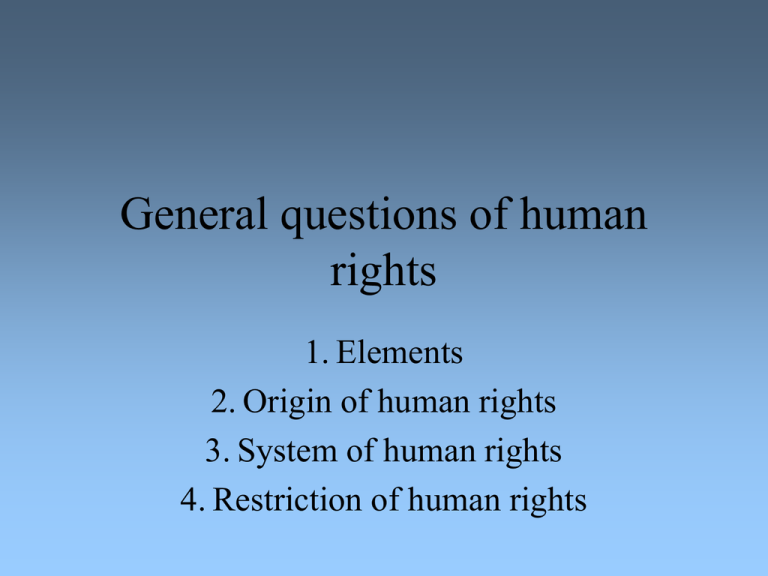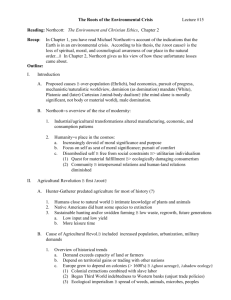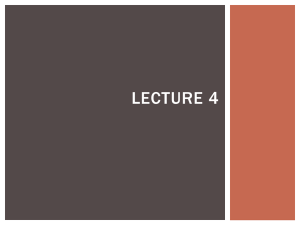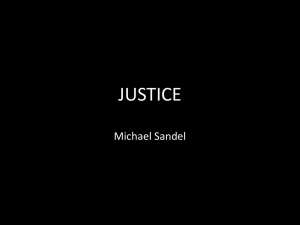1.1. Human rights
advertisement

General questions of human rights 1. Elements 2. Origin of human rights 3. System of human rights 4. Restriction of human rights 1. Elements 1.1. Human rights (Menschenrechte) • rights are due to people by virtue of human nature • the Republic of Hungary only recognizes and respects, but does NOT create • everyone has equal human rights • moral, enjoyment of rights, which are enforcable in legal way • moral rights being in Constitution <> moral requirements besides law (Waldron, Sajó); human claims, humanitarian efforts 1.2. Fundamental rights(Grundrechte) • In constitutions • In international treaties enumerated rigths 1.3. Constitutional rights • Synonym of fundamental rights • + non-human rights in Constitutions (rights of representatives) 1.4. Civil rights • Political rights of participation (for example suffrage) • Duties of citizens (for example military service) 2. Origin of human rights 2.1. Tenet of natural law Higher norms > natural, divine origin, eternal moral acts • Order defined by God > Aquinói Szent Tamás • Command of human mind > Hugo Grotius • State is based on contract > Hobbes: Leviatán • Social contract: defence of life, liberty, property > Locke: restricted government; Montesquieu: „power against power” • Priority of public purposes, „volonté generale” general will” > Rousseau The end of the 18th century- the beginning of the 19th century: human rights=innate rights 2.2.Utilitarianism • • Consequence-principled attitude Natural rights = fiction which one can only believe in Burke: „historical utilitarianism” Bentham: „happiness of most people” <> Declaration: natural rights = „absurdity going on stilts”, no universality: dictate of western civilization J.S. Mill: prevention of damage of another Sajó András: we can get to verification of individual freedom > at long term it is going to be worse for everybody; public welfare precedes human rights; as many sociaty as many kinds of human rights > no universality 2.3.Kantian legal philosophy Moral basis • Kant: freedom is postulate of mind > categorical imperative: respect of human dignity; legal system is means of liberty • Ronald Dworkin: individual constitutional rights like strong rights > for their restriction public welfare is insufficient • Hart: at least one natural moral right: everbody has the equal right to be free • Feinberg: such a world where there’re human rights is safer and more fair 3. System of human rights 3.1. Generations of human rights First generation (18th century): freedom • Negative rights > civil rights • Personal (civil) • Political: rights of participation (direct, indirect, petition) Second generation (19th century): equality • Positive rights > ECOSOC • Economic: right to labour, Trade Union, strike, property • Social: social security service, health service, right to home • Cultural: education, arts, science • Non-human rights > no moral basic • Aims of the state unforced before courts Third generation (20th century): fraternity, solidarity • global problems • the people of developing world have the right to self-determination, development, share in common heritage • failure of states: peace, healthy environment, humanitarian aid • reproduction right: „rights of future generations”, information technology 3.2. Groups of fundamental rights In relation of state and individual: Defensive rigths: status negativus (G. Jellinek) • state, feature, condition (life, corporal integrity, privacy, residence) of person • Legal position (property) • Activity (assembly, opinion) Rights of participation: status activus • Political (direct, indirect) • In wider meaning: assembly, opinion, association + freedom of information Service rights: status pozitivus • For real service> poverty minimum • Normative action > public service broadcasting, control of balance In civil law relations> objective side of rights = institutional protection 4. Restriction of human rights Depends on the origin: utilitarianism <>moral (for example torture of terrorist) 4.1. Absolute rights • human treatment of person > prohibition of torture, slavery, forced labour • capital punishment: 1972, 1976 USA; 1990 Hungary • guaranties of criminal law > presumption of innocence, prohibition of retroactive justice in the criminal legislation • restriction in emergency situation 4.2. Hierarchy of rights • • • • US SC: freedom of expression BVerfG: Menschenwürde EJEB: right to life, freedom of expression Constitutional Court of the Republic of Hungary: 1. Right to life and human dignity > DECISION 23/1990 AB 2. freedom of expression > DECISION 30/1992 AB 4.3. Matters of form • amendment of Constitution • regulation by Parliamentary acts 4.4. Matters of contents Aim: • Defence of rights of another • Institutional protection (abortion, state owned media) • Aims of states, „public interest” 4.5. The scope of restriction • US SC: pressing social need + proportionality • BVerfG: Verhältnismäßigkeit > suitability, necessity • Constitutional Court of the Republic of Hungary: * proportionality-necessity > DECISION 2/1990 AB, DECISION 20/1990 AB * more permissive test: rationality > freedom of contracting, property, discriminatio nof non-basic rights Thank you for your attention!











